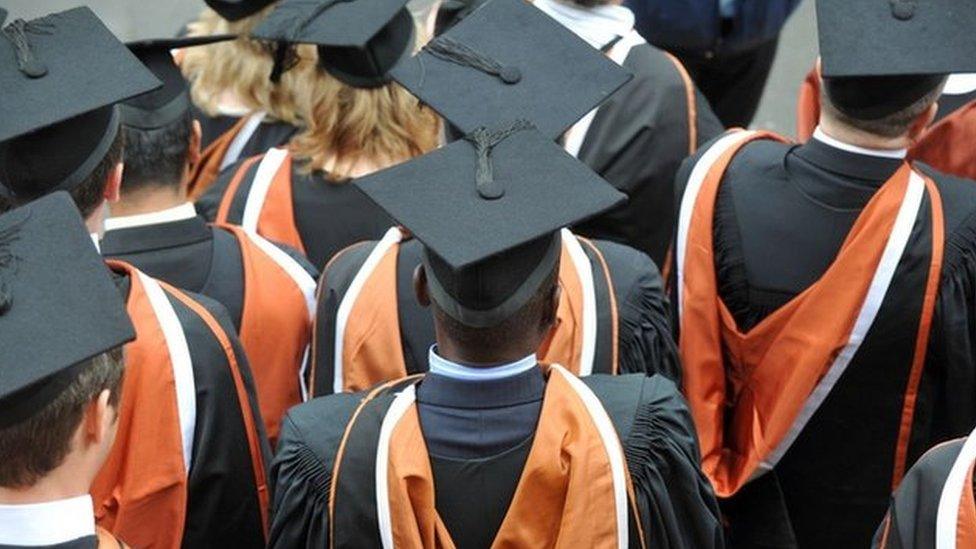Fifth of students 'poorly prepared for university'
- Published
- comments

Ucas looked at data from 27,000 students at UK universities
One in five UK students were not able to study the right subjects to prepare for a degree that interested them, says university admissions service, Ucas.
Ucas says two in five students at university said they would have made better choices if they had had better information and advice at school.
This was most apparent for courses, such as medicine and dentistry, maths, economics or languages.
Ministers said everyone should have guidance "throughout their education".
The Ucas report - Where next? - highlights the impact of qualification and subject choice at school on students' future pathways and recommends ways they can make informed choices at every stage.
It assesses data from more than 27,000 first and second year university students in the UK in 2019, 2020 and 2021, looking at the choices they made at school and into higher education.
The report stresses that young people need "early engagement" in careers information and advice, with one in three students knowing that university was an option for them at primary school.
Ucas also notes that those from advantaged homes were 1.4 times more likely to think about going to university during their primary school days than their more disadvantaged peers.
Just over a quarter (27%) of disadvantaged students said they started thinking about higher education at primary, compared with nearly two in five (39%) of their more advantaged peers.
One in four students said their parents or carers were their biggest help in determining their choice of degree course - and many followed similar academic and career routes.
Students with a parent or carer who is a medical practitioner were eight times more likely to study medicine or dentistry, Ucas found.
Disadvantaged students are more likely to report not having the relevant subjects to study medicine.
More than a quarter of students said they would make different GCSE or National 5 choices now that they know what their degree course entails - and 32% would choose a different post-16 option.
The Ucas report also found:
83% of students chose their degree subject before they chose their preferred university or college
almost all (99%) said their choices at school were influenced by how much they enjoyed the subject
when choosing a degree subject, more than 50% said good graduate employment rates were more important in the wake of the Covid-19 pandemic
49% of 18-year-olds in England with vocational qualifications, such as Btecs and Cambridge Technicals, went on to degree study, but these students were much less likely to go to top universities than those with general qualifications - with an entry rate of 3% compared to 27%.
Ucas chief executive Clare Marchant said no student should "unknowingly close the door to their career aspirations".
"The data showing that disadvantaged students tend to consider the prospect of higher education later than their more advantaged peers clearly demonstrates the need to embed careers information, advice and guidance within primary schools and early secondary years, to raise aspirations from an early age."

Ucas found two in five said they would have made better choices with better information
A spokeswoman for the Department for Education in England said: "We have invested over £100m this financial year alone towards high quality careers provision - including the rollout of the enterprise adviser network, reaching more than 4,000 schools and colleges and connecting 3.3 million young people to future employers, and national careers service support to those who need it.
"We know there is more to do, and pledged earlier this year as part of our Skills for Jobs white paper to expand this offer, rolling out services to all secondary schools and colleges in England."
'Piecemeal' advice
Geoff Barton, general secretary of the Association of School and College Leaders, said every pupil should have access to careers information and advice in helping them to choose degree courses, apprenticeships and careers.
"Unfortunately, the government dismantled national careers advice services in 2012 and left schools and colleges to pick up the pieces while squeezing their budgets.
"Matters have improved since then through various initiatives, but government support is characteristically piecemeal and inadequate.
"And many universities have not helped by the use of inappropriate unconditional offers which incentivise students to take courses that may not be the best choice for them."
Sir Peter Lampl, founder and chair of the social mobility charity, the Sutton Trust, said good guidance was particularly important for youngsters from lower income backgrounds, "who generally have less access to information through their own personal or family networks".
He added: "Students have faced unprecedented uncertainty and disruption over the past year, so it's more important than ever that they receive high-quality advice and guidance.